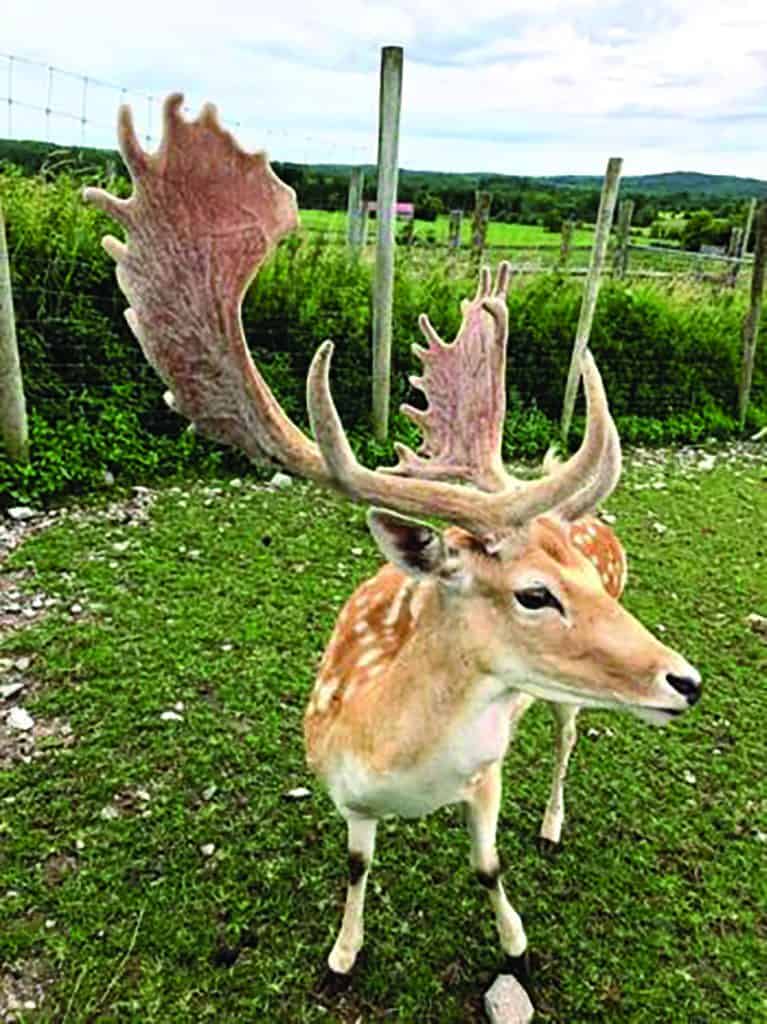
Hank Dimuzio and Rhonda Roberts of LedgEnd Farm worked with the Vermont Land Trust to conserve 132 acres of their deer farm on Munger Street. Theirs is the largest deer farm in the state with over 400 animals.
Dimuzio didn’t follow a typical path to become a farmer. For over 20 years he built up his deer farm business while working as an emergency room physician at Rutland Regional Medical Center. In 2016, he retired from the hospital to pursue farming full time.
The deer at LedgEnd Farm are fallow deer, which originate in Europe. They are one of four deer species that can be raised in Vermont, the others being red deer, elk and reindeer.
“Fallow deer are a good choice for Vermont, as their native habitat is very similar to this state. They are disease resistant and very beautiful in my opinion,” said Dimuzio.
When asked about why he conserved the land, Dimuzio explained that he grew up in a section of Philadelphia that was near a large park, an agricultural school and farmland.
“I watched it all go under; the school is still there, but the barns became antique stores.” He later moved to Vermont and started to see some of the same type of development happening here.
“You have to have towns, woodland and farms,” he said. “Humans need this open land; they need to look at farmland. You also need farmland that’s affordable.”
Dimuzio was further inspired to protect the land when many farms around him conserved with the Vermont Land Trust and the Middlebury Area Land Trust.
“If you have a lot of farmland close by, it supports farming as a whole,” he explained.
The Vermont Land Trust’s Al Karnatz, who worked with Dimuzio to conserve the land added: “Conserving many farms in an area helps stabilize the local farm economy, ensuring there’s land for new farms and farm expansion.”
By protecting the farm with a conservation easement, non-farm development is prevented. The land will stay available to future farmers.
Conservation funding came from the town of Middlebury and the Vermont Housing & Conservation Board, with matching funds from the USDA Natural Resource Conservation Service.
“VHCB is pleased to support the protection of LedgEnd Farm,” said Gus Seelig, executive director of the Vermont Housing & Conservation Board. “The recent surge in demand for local food presents an opportunity for innovative operations like this fallow deer farm. Solar panels generate electricity for the farm or for net metering back to the grid, and the venison is processed in state, further supporting our economy.”
While Vermont leads the nation in local food consumption, Dimuzio said deer farming is “not for the fainthearted… there’s not really an established market; you have to make your own market.”
To achieve this, Dimuzio sells direct from the farm and to restaurants such as Great Northern, Hen of the Wood, Waybury Inn and Starry Night Café.
“When I talk to people about marketing venison I say: ‘Find your chef, know your chef. They decide if venison is on the menu’.” LedgEnd venison can also be found at Greg’s Meat Market in Middlebury and seasonally at Healthy Living and the Warren Store.
The Town of Middlebury has been very supportive of farm conservation.
“This is truly an exciting project for Middlebury,” said Jennifer Murray, director of planning and zoning for the town. “We love that it provides a dual benefit by supporting an important local agricultural-based business while permanently protecting 28 acres of rare clayplain forest.”
Clayplain forest used to be common across the Champlain Valley but is now rare; what remains of it is important for wildlife and biodiversity, especially with our changing climate.
The Vermont Land Trust is a statewide, member-supported, nonprofit land conservation organization. Since 1977, the Vermont Land Trust has protected 2,000 parcels of land covering nearly 600,000 acres. This includes more than 900 working farms and farmland parcels, hundreds of thousands of acres of productive forestland, and numerous parcels of community lands. For more information or to become a member, visit vlt.org.




